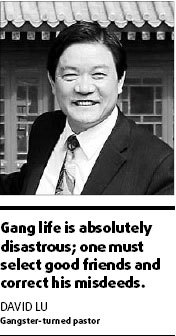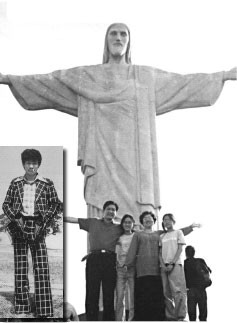Road to redemption
David Lu likens his story to that of Jean Valjean, the hardened convict-turned-saint of French author Victor Hugo's masterpiece Les Miserables. And indeed, that classic novel played a small part in Lu's transformation from gangster to priest.
Once a hatchet man for the Bamboo Union, Taiwan's largest organized crime syndicate, Lu had been in and out of prison repeatedly from 1972 to 1979 - spending time, he says, in 14 of Taiwan's 33 prisons - before an insistent young woman inspired by the fictional character Valjean helped him reform.
Now, Lu is a full-time pastor in Taiwan who's earned two doctoral degrees and is working on a third at Peking University in Beijing. And he is married to the woman who changed his life.
He says that Momentum Pictures, a UK-based film production company, has bought the rights to adapt his story to a screenplay.
Reached by phone at his office in Jhongli, a city just west of Taipei, Lu told China Daily his saga from what he now sees as the "absolutely disastrous" immersion in the world of gangs to a life of study and religious faith.
 Born in a village in Hsinchu County, Taiwan, in 1954, Lu and his two sisters and brother had a strict disciplinarian father a Kuomintang officer who forced his children to recite ancient prose and poems and a mother who, as one of "four sisters" in the Hongmen Gang, ran a gambling den at home.
Born in a village in Hsinchu County, Taiwan, in 1954, Lu and his two sisters and brother had a strict disciplinarian father a Kuomintang officer who forced his children to recite ancient prose and poems and a mother who, as one of "four sisters" in the Hongmen Gang, ran a gambling den at home.
"As an officer, my father seldom lived with us," Lu said. "My mother encouraged me to beat up others, saying I could come home if I won a fight but should stay away if I was defeated."
He followed her instructions and, from middle school on, gained a reputation among gang members for his fighting abilities.
By age 18, when he was in his second year of Dongshan High School in Taipei, Lu was an accomplished Taekwando practitioner and had earned a boxing championship in the Taiwan Junior College Games.
He crossed over from occasional thug to serious hoodlum when the head of the Hsiao Cheng Da Gang turned to him for help dealing with a dispute with the Blue Eagle Gang.
Lu rallied 10 friends, got hold of eight samurai swords and six meter-long sharpened bamboo sticks. On the night of September 30, 1972, they engaged in a vicious eight-minute fight that left one person dead and six gravely injured.
Splattered in blood, Lu returned to his dormitory looking like someone who'd just emerged from a slaughterhouse. He realized the seriousness of the fight and knew that, from now on, he'd be on the lam, in prison or even sentenced to death. The next day's newspapers confirmed that Lu was among the suspects sought by police, whereupon Lu quit school and joined the Flying Eagle Gang and later The Bamboo Union.
In his youth, he went on to serve as a bar bouncer and debt collector for gambling houses.
Six months after that first fight, Lu was tracked down and arrested in Taipei. Bailed out by his family, he was soon back in for slugging a waiter and causing damage at a restaurant.
"At that time, my wildest dream was to become an international professional hit-man who could earn huge amounts of money," Lu said. He studied English from four Filipinos he met in prison and started teaching himself Japanese and Cantonese in the hopes of going to the United States, Japan or Hong Kong, where he thought penalties for people in this line of work would be less severe.
Released in July 1974 after serving nine months, Lu set about trying to arrange a smuggling scheme, but a rival gangster ratted him out.
Just one month later, Lu was arrested for the third time and sent to the isolated Orchid Island Prison. There, he and other prisoners faced beatings by jailers, he said.
Half a year later, Lu was transferred to maximum-security Green Island and assigned to exhausting labor digging earth and building roads.
He began hatching a plan to flee, and a glimmer of hope arrived in spring 1976, when he received a letter from a woman named Chen Shiaoling.
Lu once had taken responsibility for stealing motorcycles, which were actually taken by Chen's brother, and Chen's family felt grateful. After seeing the movie version of Les Miserables, Chen, then a college freshman and also a Christian, felt Lu must have some redeeming qualities and was determined to convert him.
Lu felt moved by Chen's letter and the stream of additional letters that followed, but he remained keen on a jailbreak. On a stormy night in late July 1976, he and a fellow convict managed to get away, evading search lights and gunshots.
"I can still remember the sounds of my heart beating and the shooting behind me," Lu recalled. With pursuers on their heels, the two ran through sugar cane fields in the darkness and jumped into a river.
After their escape, the two returned to gang life, managing call girls and carrying out blackmail.
"Police had put a price of NT$300,000 on our heads, which could buy a building at that time," Lu said. "I owned six top-of-the-line guns, including one worth NT$1.5 million."
After a mere eight months on the outside, in March 1977 Lu was arrested yet again in Kaohsiung. His prison break earned him harsher conditions: He had to stand manacled for eight hours a day with only 10 minutes of rest an hour.
"I didn't want to waste time, so I decided to study more English," Lu said. He had access to a few books, practiced writing English words on his arms during the brief resting periods, memorized hundreds of words during the day, and he recited entire speeches in English at night.
Above: David Lu with his wife Chen Shiaoling and their two daughters at the foot of Jesus Christ the Redeemer in Rio de Janeiro, Brazil, in 2000. Left: David Lu in his early 20s. Courtesy of David Lu |
As his language skills improved, Lu started to pay attention to the content of some of the speeches, including those of Aristotle and Martin Luther King. Gradually, the idea of conversion began gaining ground in his mind.
He had thought Chen Shiaoling would eventually give up on him, but she didn't. Her 159th letter arrived in March 1978, and it read: "You worry me I am in mortal paradise, but you are a devil hated by everybody. Unless you come to regard evil as dung, we will remain adversaries in different worlds".
At that same time, another prisoner's sudden death shocked Lu into recognizing the fragility of human existence. For a whole night, he stayed awake thinking about the meaning of life. He decided to start anew and began spending most of his waking hours reading the Bible.
Chen faithfully continued writing. By the time of his release in November 1979, she'd sent him 500 letters, which he kept as he tried to make a fresh beginning. After he was released, Lu spent much time with Chen, falling in love with the girl who saved his soul.
After trying and failing at businesses hair salons and film production he decided to follow the example of a famous old Taiwan pastor, Wu Yong.
He also proposed to Chen. But Chen's father, a professor teaching at a junior college in Taipei, did not condone the union, asserting that, "The day that Lu reforms will be the day that dogs wear clothes".
But Wu Yong helped Lu and finally persuaded Chen's father to agree. The couple wed in January 1982.
Lu's reputation continued to follow him, however; when he returned to his hometown, villagers spat at him and threw stones, while one woman whose family he'd bullied drove him away with a broom.
He learned that the villagers had celebrated his imprisonment with firecrackers and could not believe such a monster had turned into a good man.
With persistence, though, Lu demonstrated his sincerity and people came to accept his apologies.
During the following seven years, he worked hard as a pastor and often went to prison to preach. Reflecting his past, Lu was very grateful to Chen who was both his wife and colleague. He was also very proud of their two daughters, who are undergraduates at the University of California at Berkeley.
Despite his criminal past, the Dallas Theological Seminary in the United States accepted Lu for graduate study in 1989. He earned a doctorate in theology there, followed by another doctorate in education from North Texas University.
Meanwhile, with the help of a senator who was a friend of the Dallas seminary's president, Lu obtained permanent residency in the United States and began regularly shuttling between the United States and Taiwan.
His multiple degrees only encouraged his love of study, so he enrolled in a master's and doctoral program in philosophy at Peking University in 2000.
Along with his seemingly unending studies, Lu runs an evangelical seminary in Taiwan, and says he has already taught 600 students English in Shenzhen, Xiamen, Shanghai and Taiwan via a cable, charging them the low price of 300 yuan ($38) a semester. He says more than 3,000 prisoners in Taiwan have sworn to begin a new life as a result of his proselytizing. He also has raised more than $1 million to open Hope primary schools in Fujian Province.
Lu talks proudly of a 3-year-old girl he taught, who can recite passages from the Bible in English. And he says his website is a place where all sorts of people seek his help. He travels frequently to the Chinese mainland to visit his many Christian friends there and says he finds it increasingly open and free.
"In 1993, when I visited a village in Jiangsu Province, local police misunderstood me and kept an eye on me," Lu said. "Such things don't happen now."
According to the Chinese Protestant Church's website, China has 50,000 open churches and 16 million Christians. More than 5,000 theological graduates now serve across China.
However, Huo Guihuan, director of Department of Philosophy and Culture at the Chinese Academy of Social Sciences, said Lu's experience indicated modern society lacks adaptive moral regulations.
"On the contrary, religions always toughen people's hearts. So, some people have to turn to religion to relieve themselves of painful experiences. Modern societies need to enhance the development of moral regulations."
Reflecting his past, Lu emphasized one point above all, saying that this is his most important message to youngsters: "Gang life is absolutely disastrous; one must select good friends and correct his misdeeds."
(China Daily 05/08/2007 page20)















